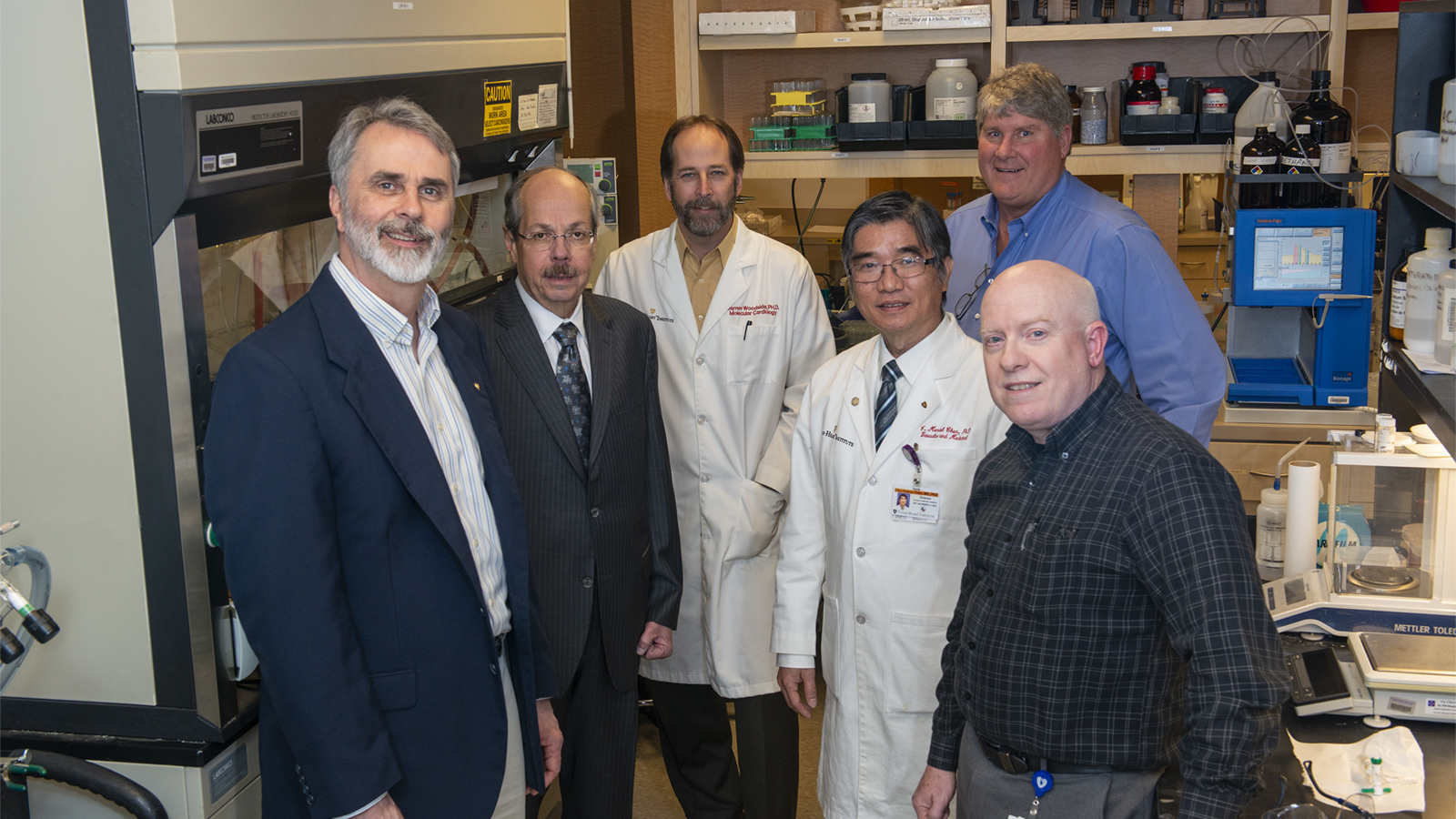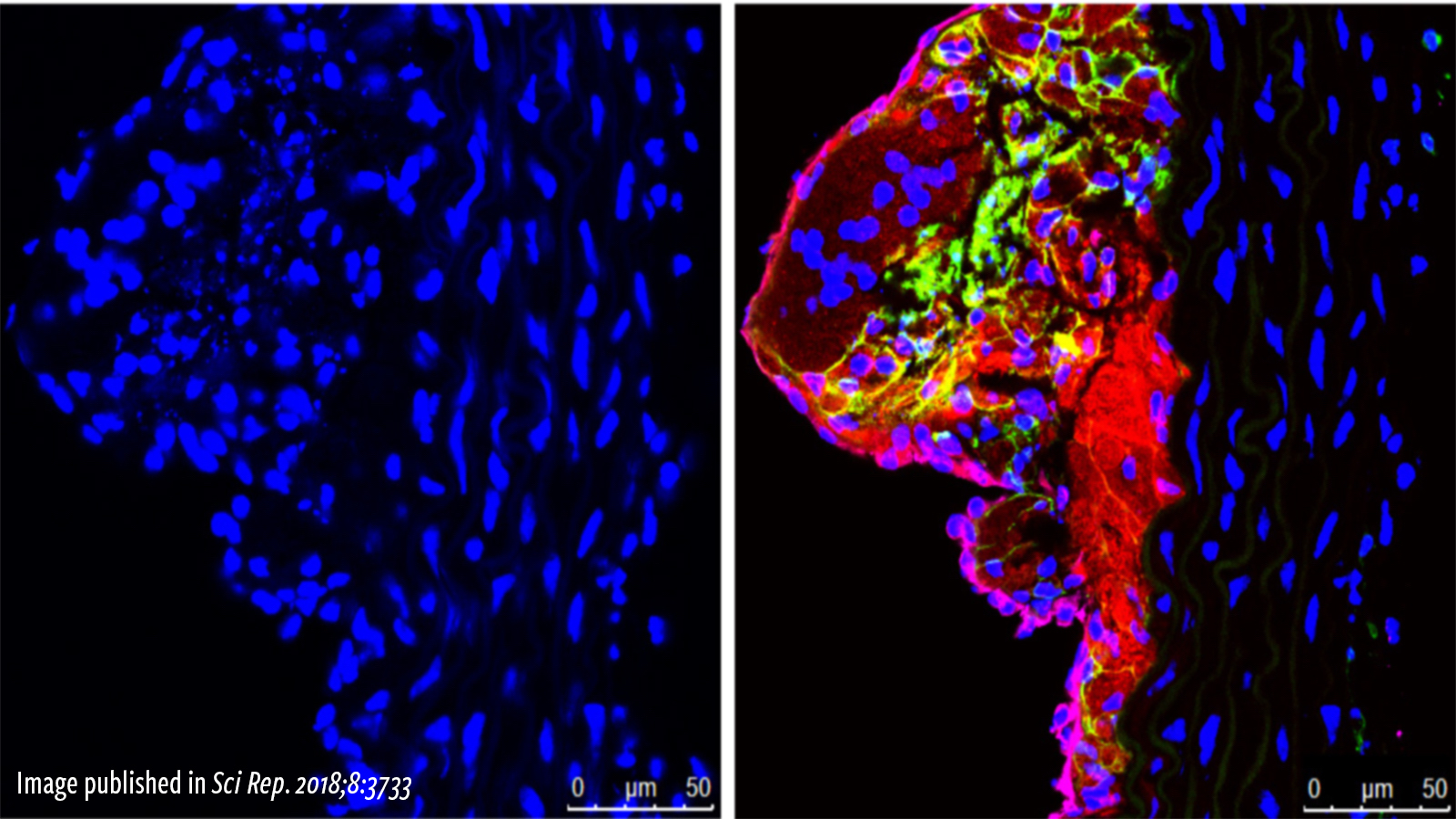“We have discovered specific molecular targeting techniques that could have advantages over current noninvasive imaging approaches because these new techniques do not involve radiation exposure, can be used in MRI scanners that are widely available, and may be used to deliver therapeutic agents”
-Darren Woodside, PhD Molecular Cardiology Research Laboratories
The Molecular Cardiology Research team at THI continues to make progress in the quest to improve care through new discoveries in molecular biology. Led by esteemed scientists Dr. Richard Dixon, Director, and Drs. Peter Vanderslice, Ron Biediger, Mendel Chen, and Darren Woodside, the team has made significant discoveries in the use of small molecules for diagnostic and therapeutic medicine.
The research groups in the Molecular Cardiology Research Laboratories have produced more than ten new chemical entities that have entered human testing, one of which has led to an approved drug and two promising adhesion molecule antagonists.
2018 By the Numbers
This year, the group published eight original scientific publications and 12 symposium abstracts, and members of the team gave seven invited lectures and presentations at national and international meetings. In addition, the team has contributed significantly to the scientific community by serving on editorial boards, NIH Study Sections, and Scientific Advisory Boards and by reviewing submitted articles for scientific journals.
The team continues its licensing efforts with pharmaceutical partners to work toward completing preclinical studies for submitting Investigational New Drug Applications to the Food and Drug Administration. This milestone is an important and necessary step toward moving the small-molecule research and intellectual property developed here at THI into novel therapies for patients.
They also discovered new links between imprinted gene networks and cardiac dysfunction by using genetic network interaction analyses. Another exciting research focus is the use of microRNA as a potential treatment strategy for cardiac hypertrophy in pulmonary arterial hypertension.
In support of THI’s educational mission, the research team has developed and implemented an educational/training program that has successfully hosted four international students to date.
New Methods for Earlier Identification of Patients at High Risk of Heart Attack or Stroke Due to Inflamed Arterial Plaque
Treating risk factors for atherosclerosis, such as high blood pressure and cholesterol levels, has reduced mortality rates. However, these same risk factors are poor indicators of sudden, serious, and recurrent cardiovascular events.
Coronary artery disease develops when plaque accumulates in a coronary artery, leading to hardening of the artery (atherosclerosis). This accumulation prevents blood flow to the heart, causing coronary artery disease. Inflammatory cells contribute to plaque formation and may be important indicators of acute events like heart attack and stroke.
There are currently no noninvasive imaging tools readily available for clinical use to identify patients at high risk of having an acute event due to inflamed atherosclerotic plaque. A technique that can clearly identify inflamed plaques could allow physicians to more accurately characterize patient risk.
More than two decades ago, Dr. James T. Willerson, THI President Emeritus, and colleagues at THI identified a receptor on vascular cells that directs inflammatory cells to atherosclerotic plaques. Building on this research, Dr. Willerson and his team of scientists then collaborated to design a targeted imaging contrast agent that binds to this receptor to identify inflamed atherosclerotic plaque.
Director Spotlights
THI's molecular cardiology research benefits from an unparalleled leadership team with a strong track record of making significant discoveries in the use of small molecules for diagnostic and therapeutic medicine and shepherding these discoveries along the drug development track.

Richard Dixon, PhD | Director
Dr. Dixon is the Director of the Wafic Said Molecular Cardiology Research Laboratories at THI. Over his long career, he has been involved in many aspects of pharmaceutical and biotechnology research and development. Formerly, he was a founder, Director, and Chief Science Officer of Encysive Pharmaceuticals. Before that, Dr. Dixon held various management positions, including head of the molecular biology department at Merck and Co. Dr. Dixon’s basic research efforts focus on the molecular biology and pharmacology of intracellular signaling and cell trafficking. He and his group were the first to clone and characterize a G-protein–coupled receptor, the beta2 adrenergic receptor, which resulted in the awarding of the 2012 Nobel Prize in Chemistry to his colleagues.
Peter Vanderslice, PhD | Director
Dr. Vanderslice is the Director of Biology in the Molecular Cardiology Research Laboratories. He has spent his professional career leading teams focused on developing small-molecule compounds that target cell adhesion—a key step in the progression of inflammatory diseases, including atherosclerosis. Joining THI in 2008 from the pharmaceutical industry, Dr. Vanderslice has experience with each stage of the drug development pipeline, from discovery to progression into clinical trials. At THI, he has spearheaded a program developing a compound discovered here to enhance stem cell therapy, as well as for use as an immunotherapeutic for cancer. The program is at the stage of preparing an Investigational New Drug Application for the FDA, the first step in the path to drug approval.
Mendel Chen, MD, PhD | Director
Mendel Chen, MD, PhD, is the Director of Vascular and Medicinal Research in the Molecular Cardiology Research Laboratories. Dr. Chen’s clinical practice and research centers on the harmful effects of low-density lipoproteins and the mechanisms of their action in cardiovascular disease. He and his group have identified a subfraction of lipoprotein, termed L5, that is particularly atherogenic. He has authored over 150 manuscripts and is internationally recognized in this field.
Ron Biediger, PhD | Associate Director
Dr. Biediger is currently Associate Director of Chemistry in the Molecular Cardiology Research Laboratories. Previously, Dr. Biediger was the Senior Director of Medicinal Chemistry at Encysive Pharmaceuticals. There, he directed numerous drug discovery and development projects that resulted in four new chemical entities that have entered human clinical testing, including one cell adhesion molecule antagonist that has successfully completed phase I clinical trials. He was part of the team that completed the first total synthesis of Taxol. At THI, Dr. Biediger and his team have invented numerous small-molecule drugs, some of which have been outlicensed and are now poised to enter phase I clinical testing.
Darren Woodside, PhD | Associate Director
Dr. Woodside is an Associate Director of the Molecular Cardiology Research Laboratories at THI. His previous positions include Associate Director of Drug Discovery at Encysive Pharmaceuticals. Dr. Woodside’s research centers around the role that cell adhesion molecules play in cardiovascular and autoimmune diseases and the development of novel means to identify and treat these diseases. He has authored numerous publications and has served on editorial review boards, and he currently chairs the NIH Innovative Immunology Study Section.

.svg)



